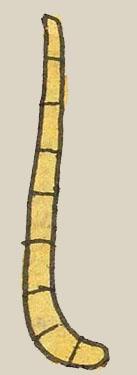otlatl (Mdz46r)
This element has been carved from the compound sign for the place name, Otlatitlan. It shows a stalk of bamboo or stout cane-like material, with segmentation, and a curve at the bottom (turning to our right). In this example, the cane is yello and segmented.
Stephanie Wood
In the Florentine Codex "utlatl" are mentioned in a pairing with the word for battens (for weaving), tzotzopaztli, which provides an idea of the probably many uses of such stalks or stout canes. On folio 42r, one can see two groups of different types of canes, on the left, the terracotta-colored otlatl (cañas macizas), and on the right are the cañas that were used for making arrows (surely, acatl). An arrow appears next to the group on the right The otlatl can have a single horizontal line separating the segments of the canes. The acatl can have double horizontal lines separating their segments. The cane on the arrow also has these double horizontal lines of the acatl.
For a staff of otlatl (or a bastón de caña dura), see Marc Thouvenot's vignette about the Yacateuctli, with a focus on an image taken from the Códice Matritense del Palacio Real, https://vignettes.sup-infor.com/imagen/4-PR_01_262r_c. Other examples of otlatl also appear below.
Stephanie Wood
c. 1541, but by 1553 at the latest
Stephanie Wood
reeds, tules, carrizos, plants, arrows, darts, tules, carrizos

otla(tl), bamboo, cane, https://nahuatl.wired-humanities.org/content/otlatl
bamboo
Mexico City
Stephanie Wood
Codex Mendoza, folio 46 recto, https://digital.bodleian.ox.ac.uk/objects/2fea788e-2aa2-4f08-b6d9-648c00..., image 102 of 188.
The Bodleian Libraries, University of Oxford, hold the original manuscript, the MS. Arch. Selden. A. 1. This image is published here under the UK Creative Commons, “Attribution-NonCommercial-ShareAlike 3.0 License” (CC-BY-NC-SA 3.0).

